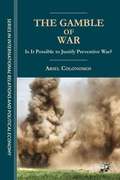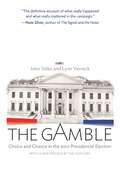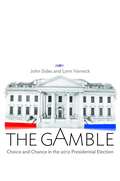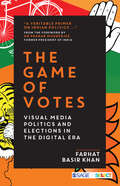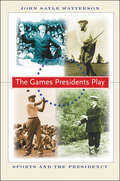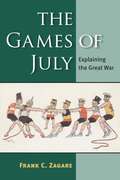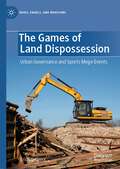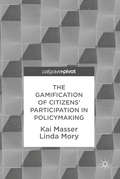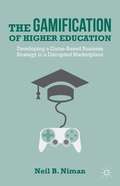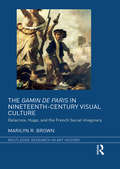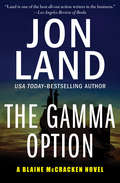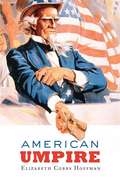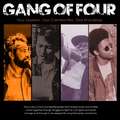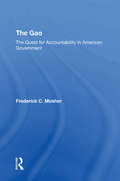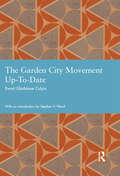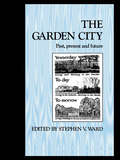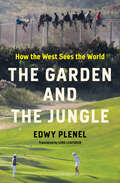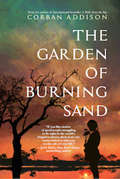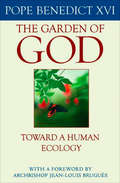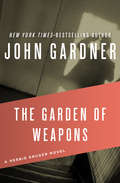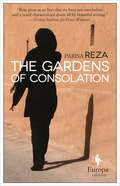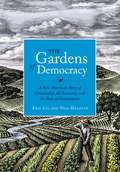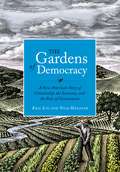- Table View
- List View
The Gamble of War: Is It Possible to Justify Preventive War? (The Sciences Po Series in International Relations and Political Economy)
by Chris TurnerThis book analyzes the justification of preventive war in contemporary asymmetrical international relations. It focuses on the most crucial aspect of prevention: uncertainty. It builds a new framework where the role of luck—whether military, political, moral, or normative—is a corrective to the traditional approaches of the just war tradition.
The Gamble: Choice and Chance in the 2012 Presidential Election - Updated Edition
by Lynn Vavreck John SidesA unique "moneyball" look at the 2012 U.S. presidential contest between Barack Obama and Mitt Romney"Game changer." We heard it so many times during the 2012 U.S. presidential election. But what actually made a difference in the contest—and what was just hype? In this groundbreaking book, John Sides and Lynn Vavreck tell the dramatic story of the election—with a big difference. Using an unusual "moneyball" approach and drawing on extensive quantitative data, they look beyond the anecdote, folklore, and conventional wisdom that often pass for election analysis to separate what was truly important from what was irrelevant. The Gamble combines this data with the best social science research and colorful on-the-ground reporting, providing the most accurate and precise account of the election yet written—and the only book of its kind.In a new preface, the authors reflect on the place of The Gamble in the tradition of presidential election studies, its reception to date, and possible paths for future social science research.
The Gamble: High Rollers
by Lynn Vavreck John Sides"High Rollers" is the fourth and final free eBook preview chapter from John Sides and Lynn Vavreck's groundbreaking Fall 2013 book, The Gamble: Choice and Chance in the 2012 Presidential Election.Picking up where the third chapter, "All In," left off, "High Rollers" continues the dramatic story of the 2012 campaign into the summer. As Barack Obama and Mitt Romney began to face off directly, the contest was now down to two well financed and seasoned campaigners--"high rollers" playing the game of presidential politics at the highest level and putting everything on the table. With the race close in the polls, Obama and Romney began to place big and sometimes risky bets to change the dynamics of the race and establish a substantial lead. In combative ads and speeches, Obama tried to depict Romney as a rich, out-of-touch, and insensitive businessman. Romney selected Paul Ryan as his running mate, potentially signaling an unexpected shift in message from Obama's handling of the economy to a debate about the size of government and the national debt. But despite such high-stakes bets, the candidates were so equally matched that they largely played to a draw over the summer, and there was no net change in the polls between the beginning of May and the end of August. As Sides and Vavreck tell the story of the summer, they explain why such stability is actually typical of the competitive environment of presidential campaigns.The Gamble, which is scheduled to be published as a complete print and eBook in October 2013, tells the story of the election--with a big difference. Using an unusual "moneyball" approach, Sides and Vavreck look beyond the anecdote, folklore, and conventional wisdom that often pass for election analysis. Instead, they draw on extensive quantitative data about the economy, public opinion, news coverage, and political advertising to separate what actually made a difference in the contest--and what was just hype. Combining this data with the best social science research and colorful on-the-ground reporting, they look at the interplay between the candidates' strategic choices--the ads, speeches, rallies, and debates--and the chance circumstances of the election, especially the economy. The most accurate and precise account of the election yet written, and the only book of its kind, The Gamble is a must-read for political junkies, analysts, journalists, consultants, and academics.To find out more, download this chapter and begin reading the authors' special introduction to this and the other free chapters.
The Game of Votes: Visual Media Politics and Elections in the Digital Era
by Farhat Basir KhanTaking the reader on a roller coaster ride, The Game of Votes showcases the full spectrum of the key actors and stars of the electoral arena, the rise and fall of political parties, the role of the digital and technology platforms, and the emergence of fake news impacting election outcome in India and across the world. The book is a veritable prime on Indian politics, as it runs through the entire history of Indian polity and provides insights into how political parties gradually shifted from campaigning on their own to hiring top-notch advertising agencies. It tells the story of how Modi won the election in 2014 and repeated an exceptional performance in 2019. It also gives a bird’s eye view of how Barack Obama and Donald Trump ran their election campaigns and how to understand critical developments in political communication. The book provides glimpses of international politics in the US and Europe and covers important developments in Egypt and South East Asia, drawing comparisons between the Western world with the fast-changing developments in India. This book brings the readers face-to-face with the changing dynamics of election campaign and democracy. This is the inside story behind the game of votes in India.
The Games Presidents Play: Sports and the Presidency
by John Sayle WattersonThe Games Presidents Play provides a new way to view the American presidency. Looking at the athletic strengths, feats, and shortcomings of our presidents, John Sayle Watterson explores not only their health, physical attributes, personalities, and sports IQs, but also the increasing trend of Americans in the past century to equate sporting achievements with courage, manliness, and political competence.The author of College Football begins with George Washington, whose athleticism contributed to his success on the battlefield and may well have contributed to the birth of the republic. He moves seamlessly into the nineteenth century when, for presidents like Jackson, Lincoln, and Cleveland, frontier sports were part of their formative years. With the twentieth-century presidents—most notably the hyperactive and headline-grabbing Theodore Roosevelt—Watterson shows how the growth of mass media and the improved means of transportation transformed presidential sports into both a form of recreation and a means of establishing a positive self-image.Modern presidents have used sports with varying degrees of success. Herbert Hoover fled Washington on weekends to the trout pools of Camp Rapidan in the Blue Ridge to escape relentless pressures and public criticism during the Great Depression. Franklin Roosevelt demonstrated remarkable physical endurance in his campaign to restore his ravaged body from polio. An obsessive love affair with golf became an issue for Dwight Eisenhower in his campaign for reelection in 1956. Richard Nixon, a former third-string college football lineman, placed calls to Coach George Allen of the Washington Redskins, once suggesting a trick play in a big game.From the opening pitch of the baseball season to presenting awards to Olympic champions, our sports culture asks the president to play an increasingly active role. Sports, Watterson argues, open a window into the presidency, shedding new light on presidential behavior and offering new perspectives on the office and the sporting men—and women—who have and will occupy it.
The Games Presidents Play: Sports and the Presidency
by John Sayle WattersonThis look at the connections between sportsmanship and statesmanship “introduces an intriguing way of evaluating presidential fitness for office” (Richmond Times-Dispatch).Whether throwing out the first pitch of the baseball season, fishing for trout, or cheating at golf, American presidents through history have had connections to the world of sports in many ways. This book explores how various commanders-in-chief worked and played—and how their athletic activities reflected their political identities.The author considers George Washington, whose athleticism contributed to his success on the battlefield and perhaps to the birth of the republic. He moves into the nineteenth century, when frontier sports were part of the formative years of Jackson, Lincoln, and Cleveland. With twentieth-century presidents—most notably the hyperactive, headline-grabbing Teddy Roosevelt—he shows how the growth of mass media and transportation transformed presidential sports into both a form of recreation and a means of establishing a positive image. Exploring everything from FDR’s fight to restore his polio-ravaged body to Eisenhower’s obsessive love affair with golf to Nixon’s enthusiasm for football, this book uses sports to open a window onto the presidency and the nation’s culture, as well as the strengths, weaknesses, and personalities of America’s leaders.“Watterson’s history rises above trivia in its attention to the political ramifications of presidents’ sports while also being a consistently entertaining trove of lore and, as the author puts it, ‘just weird stuff,’ such as John Q. Adams granting an interview while skinny-dipping. A wry and perceptive work.” —Booklist “An enjoyable study of politics and culture.” —Publishers Weekly“Will appeal to history buffs and sports fans alike.” —Library Journal
The Games of July: Explaining the Great War
by Frank C. ZagareTaking advantage of recent advances in game theory and the latest historiography, Frank C. Zagare offers a new, provocative interpretation of the events that led to the outbreak of World War I. He analyzes key events from Bismarck's surprising decision in 1879 to enter into a strategic alliance with Austria-Hungary to the escalation that culminated in a full-scale global war. Zagare concludes that, while the war was most certainly unintended, it was in no sense accidental or inevitable. The Games of July serves not only as an analytical narrative but also as a work of theoretical assessment. Standard realist and liberal explanations of the Great War are evaluated along with a collection of game-theoretic models known as perfect deterrence theory.
The Games of Land Dispossession: Urban Governance and Sports Mega-Events (Marx, Engels, and Marxisms)
by Erick OmenaThis book offers a comparative study of state strategies in relation to urban redevelopment projects associated with sports mega-events in Brazil, South Africa and the United Kingdom. It examines urban governance strategies employed to dispossess working-class communities of their land and counteract the subsequent emergence of discontent in various national contexts, offering an intricate analysis of the mechanisms of class dominance operating across diverse regions of the globe. This is based on the application of Gramscian theory concerning the capitalist state and its fluid interplay between coercion and consent. Juxtaposing historical trajectories in the execution of redevelopment initiatives linked to large-scale sporting events, the book offers an in-depth examination of the state-civil society relations shaping the London 2012 and Rio 2016 Olympic Parks, alongside the regeneration initiatives concerning the Maracanã stadium in Rio de Janeiro and the Ellis Park stadium in Johannesburg – respectively earmarked for the 2014 and 2010 FIFA World Cups. Drawing on insights from a range of disciplines and an explicitly Gramscian analytical framework, this book will appeal to students and scholars in urban planning, sport sociology, development studies, and human geography.
The Gamification of Citizens' Participation in Policymaking
by Kai Masser Linda MoryThis book examines the use of game elements to encourage citizens to participate in political decision-making and the planning of large-scale public sector projects. It argues that success is based on a personal concern with the project and a belief in the influence on political decision making, but also on fun. Without fun, only a very small group of the ‘usual suspects’ will participate, especially in classic policymaking approaches like citizens’ panels which require time and physical attendance. The book also examines the relationship between representative democracy and citizen participation from the perspective of direct democratic instruments in Germany. Readers from different countries with different political systems can decide for themselves, if and how the results from Germany are transferable to their respective conditions. Grounded in theoretical literature and statistical data, the book also makes use of narratives, applying a ‘storytelling’ approach to the case studies.
The Gamification of Higher Education
by Neil B. NimanInstead of thinking about education as the mastery of a body of knowledge where the subject matter becomes the focus of our attention, The Gamification of Higher Education encourages us to think of it as a process that draws out the best in individuals and prepares them for happy, productive, and successful lives.
The Gamin de Paris in Nineteenth-Century Visual Culture: Delacroix, Hugo, and the French Social Imaginary (Routledge Research in Art History)
by Marilyn R. BrownThe revolutionary boy at the barricades was memorably envisioned in Eugène Delacroix’s painting Liberty Leading the People (1830) and Victor Hugo’s novel Les Misérables (1862). Over the course of the nineteenth century, images of the Paris urchin entered the collective social imaginary as cultural and psychic sites of memory, whether in avant-garde or more conventional visual culture. Visual and literary paradigms of the mythical gamin de Paris were born of recurring political revolutions (1830, 1832, 1848, 1871) and of masculine, bourgeois identity constructions that responded to continuing struggles over visions and fantasies of nationhood. With the destabilization of traditional, patriarchal family models, the diminishing of the father’s symbolic role, and the intensification of the brotherly urchin’s psychosexual relationship with the allegorical motherland, what had initially been socially marginal eventually became symbolically central in classed and gendered inventions and repeated re-inventions of "fraternity," "people," and "nation." Within a fundamentally split conception of "the people," the bohemian boy insurrectionary, an embodiment of freedom, was transformed by ongoing discourses of power and reform, of victimization and agency, into a capitalist entrepreneur, schoolboy, colonizer, and budding military defender of the fatherland. A contested figure of the city became a contradictory emblem of the nation.
The Gamma Option: The Omega Command, The Alpha Deception, And The Gamma Option (The Blaine McCracken Novels #3)
by Jon LandWhen his estranged son is kidnapped, Blaine McCracken goes to work for a group of Arab militants to recover the child he never knew Since he first went behind enemy lines in Vietnam, Blaine McCracken has faced death on every continent. In the line of fire he is an iron man, but now he faces a different challenge: fatherhood. His son, Matt, is thirteen—the unknown product of a long ago tryst. When the boy&’s mother dies, McCracken goes to England to meet him. He finds a son cut in his father&’s mold: a young athlete determined to put his body at risk to serve his country. But before Blaine can explain their relationship, Matt is snatched away, kidnapped by a band of Arab nationals intent on using McCracken&’s strength to serve their own cause. The target? An Israeli weapon that they claim threatens the entire Arab world. To recover his son, McCracken must bring the Middle East back from the brink of war. This ebook features an illustrated biography of Jon Land including rare photos from the author&’s personal collection.
The Gandhian Moment
by Ramin JahanbeglooCommentators call the United States an empire: occasionally a benign empire, sometimes an empire in denial, often a destructive empire. In American Umpire Elizabeth Cobbs Hoffman asserts instead that America has performed the role of umpire since 1776, compelling adherence to rules that gradually earned broad approval, and violating them as well.
The Gandhian Moment
by Ramin JahanbeglooGandhi is revered as a historic leader, the father of Indian independence, and the inspiration for nonviolent protest around the world. But the importance of these practical achievements has obscured Gandhi’s stature as an extraordinarily innovative political thinker. Ramin Jahanbegloo presents Gandhi the political theorist-the intellectual founder of a system predicated on the power of nonviolence to challenge state sovereignty and domination. A philosopher and an activist in his own right, Jahanbegloo guides us through Gandhi’s core ideas, shows how they shaped political protest from 1960s America to the fall of the Berlin Wall and beyond, and calls for their use today by Muslims demanding change. Gandhi challenged mainstream political ideas most forcefully on sovereignty. He argued that state power is not legitimate simply when it commands general support or because it protects us from anarchy. Instead, legitimacy depends on the consent of dutiful citizens willing to challenge the state nonviolently when it acts immorally. The culmination of the inner struggle to recognize one’s duty to act, Jahanbegloo says, is the ultimate “Gandhian moment. ” Gandhi’s ideas have motivated such famous figures as Martin Luther King, Nelson Mandela, and the Dalai Lama. As Jahanbegloo demonstrates, they also inspired the unheralded Muslim activists Abul Kalam Azad and Khan Abdul Ghaffar Khan, whose work for Indian independence answers those today who doubt the viability of nonviolent Islamic protest. The book is a powerful reminder of Gandhi’s enduring political relevance and a pioneering account of his extraordinary intellectual achievements.
The Gang of Four: Four Leaders, Four Communities, One Friendship
by Bob Santos Gary IwamotoSeattle's Gang of Four changed the face of the city in the 1960s, '70s, and '80s by bringing four ethnic groups together in battle against city powerbrokers over development, poverty, fishing rights, and gentrification.<P><P> The four leaders learned quickly that working together provided greater results than working apart. This is the story of a powerful political alliance and lifelong friendships forged through sit-ins, protest rallies, and other acts of civil disobedience. "We got very good at occupying buildings," remarked one of the Gang.Bob Santos and Gary Iwamoto recall how a Native American, Asian American, African American, and Mexican American came together to fight for their neighborhoods and their people.Bob Santos has spent most of his life in the International District of Seattle. He grew up in the N.P. Hotel with his widowed father, Sammy Santos, a professional prizefighter. He was hired in 1972 to lead the International District Improvement Association (Inter*Im). During his tenure at Inter*Im, Santos organized property owners, businesses, residents, and activists from the Asian American community to preserve the neighborhood and build new housing.Gary Iwamoto is a regular contributing writer for the International Examiner, an Asian Pacific Islander community newspaper. He has written several plays, notably Miss Minidoka 1943, which was produced by the Northwest Asian American Theater. He and Bob Santos also wrote Humbows, Not Hot Dogs in 2002.
The Gao: The Quest For Accountability In American Government
by Frederick C MosherThis book concerns accountability and the institution initially set up for the purpose of assuring accountability for governmental performance. It enhances understanding of the nature of the General Accounting Office (GAO) as an institution and its role in the American system of government.
The Garden City Movement Up-To-Date (Studies in International Planning History)
by Ewart Gladstone CulpinThis work was written and compiled by the then Secretary of the Garden Cities and Town Planning Association in 1913. It shows just how much the conception of the garden city had been broadened from Howard’s original texts. Indeed the Association’s own name had been broadened to add the newly emergent practice and theory of town planning to the original focus. Alongside the garden city, recognition is now given to the burgeoning numbers of garden suburbs and garden villages. Many examples of these are identified and briefly described, including many which are small and now little known, greatly adding to the interest of the publication. Even the underlying arguments for such developments differ. Alongside the more altruistic arguments in favour of reform, there are now those which explicitly emphasise the need to ensure a healthy race to maintain the Empire.
The Garden City: Past, present and future (Planning, History and Environment Series)
by Stephen WardThis examination of a phenomenon of 19th century planning traces the origins, implementation, international transference and adoption of the Garden City idea. It also considers its continuing relevance in the late 20th century and into the 21st century.
The Garden and the Jungle: How the West Sees the World
by Edwy PlenelAn award-winning French journalist&’s far-ranging critique of Europe&’s betrayal of universal values and equal rights as war and right-wing populism spread worldwide, with a new introduction for U.S. readers.&“Europe is a garden…It is the best combination of political freedom, economic prosperity, and social cohesion that the humankind has been able to build…Most of the rest of the world is a jungle, and the jungle could invade the garden.&” This is how Josep Borrell, High Representative of the European Union for Foreign Affairs and Security Policy, characterized the situation in 2022, several months after Russia&’s invasion of Ukraine and one year before Israel&’s war against Gaza.Europe has a singular image of itself and of the world. It persists in thinking of itself as the cradle of civilization, the incarnation of good and justice, threatened by a global environment where savagery, darkness, and evil reign. Clinging to this fantasy inherited from a colonial past, it is lost and misguided, turning its back on the values of humanism and equality to which it nevertheless claims to adhere. As long as Europe and, with it, the political West, have not renounced their desire for power, there will unite against them the resentment of all the peoples who have had the bitter experience of their domination over the last five centuries. Because the &“jungle&” is Europe&’s own creation, produced by the blindness of conquest and exploitation.This powerful essay is an invitation to rebuild a Europe that is truly concerned about the fragility of the world and of life, with an acute awareness of the perils that threaten humanity.
The Garden of Burning Sand
by Corban AddisonThe New York Times bestselling author John Hart raved that "If you like stories of good people struggling to do right in the world's forgotten places, there is no one better suited than Corban Addison to take you on the ride of your life." In The Garden of Burning Sand, Addison, the bestselling author of A Walk Across the Sun, creates a powerful and poignant novel that takes the reader from the red light areas of Lusaka, Zambia, to the gilded chambers of the Washington, D.C. elite, to the splendor of Victoria Falls and Cape Town. Zoe Fleming, an accomplished young human rights attorney, has made a life for herself in Zambia, far from her estranged father--an American business mogul with presidential aspirations--and from the devastating betrayals of her past. When a young girl with Down syndrome is sexually assaulted in a Lusaka slum, Zoe joins Zambian police officer Joseph Kabuta in investigating the rape. Piecing together clues from the victim's past, they discover an unsettling connection between the girl--Kuyeya--and a powerful Zambian family who will stop at nothing to bury the truth. As they are drawn deeper into the complex web of characters behind this appalling crime, Zoe and Joseph forge a bond of trust and friendship that slowly transforms into love. Opposed on all sides, they find themselves caught in a dangerous clash between the forces of justice and power. To successfully prosecute Kuyeya's attacker and build a future with Joseph, Zoe must risk her life and her heart--and confront the dark past she thought she had left behind.From the Hardcover edition.
The Garden of God: Toward a Human Ecology
by Pope Benedict XVIIn this collection of his writings, Pope Benedict XVI speak to the important relationships between the environment, Catholic social teaching, and theology. During his papacy, Pope Benedict XVI repeatedly drew attention to the environment. He spoke of preserving it, such as his address concerning the Amazon rainforest and his letter regarding the Arctic, and of distributing its vital resources—such as water—more equitably. Benedict led by example when the Vatican became the first carbon-neutral country in the world. This book collects Benedict&’s many audiences, addresses, letters, and homilies on a wide range of topics dealing with the world about us. The major themes and connections he explores include creation and the natural world; the environment, science, and technology; and hunger, poverty, and the earth&’s resources. In these pages, Benedict insists that if we truly desire peace, we must consciously nurture all of creation. He speaks in favor of alternative energy while speaking out against the spread of nuclear weapons and threats to biodiversity. He urges sustainable development, equitable distribution of food and water, and an end to hunger. In summation, Benedict argues that our love of God should cause us to protect the environment, and that in turn, our heightened appreciation of the natural world will draw us closer to God.
The Garden of Weapons
by John GardnerA shocking defection draws Herbie back to the most treacherous city on earth: Berlin The younger British spies think of Big Herbie Kruger as a middle-aged relic from the early days of the Cold War. Only a few people know that Kruger is one of England's most important agents--a quick-witted devil with more power than anyone knows. In 1955, Kruger established a German intelligence network with an unparalleled reach into the Soviet Union. Years later, he feels a twinge of sadness when he learns that his old KGB rival has run afoul of state security, and been forced to take his own life. But Kruger doesn't count on the dead man's lieutenant. Rather than face Moscow's wrath, the Russian defects into Kruger's hands--a bit of good fortune that soon calls up all sorts of old ghosts. In Berlin, the divided city, Herbie Kruger is about to be split in half.
The Gardens of Consolation
by Parisa RezaA novel of love, family, and a fight for freedom in Iran featuring a &“formidable and hard-to-forget heroine&” (Publishers Weekly). In the early 1920s, in the remote Persian village of Ghamsar, two young people dreaming of a better life fall in love and marry. Sardar brings his bride, Talla, with him across the mountains to the suburbs of Tehran, where the couple settles down and builds a home. From the outskirts of the capital city, they will watch as the Qajar dynasty falls and Reza Khan rises to power as Reza Shah Pahlavi. Into this family of illiterate shepherds is born Bahram, a boy whose brilliance and intellectual promise are apparent from a very young age. As he grows older, Bahram will become a fervent follower of reformer Mohammad Mosaddegh and will participate firsthand in his country&’s political and social upheavals, putting himself in mortal danger, in this prize-winning, &“compelling book [that] raises important questions about indulgence, gender, community, and the impact of politics on everyday life&” (Kirkus Reviews). &“Exquisite . . . the narrative evolves from an intimate chronicle of Talla and Sardar&’s provincial lives into a sweeping tour through early-20th-century Iran.&” —The New York Times
The Gardens of Democracy
by Nick Hanauer Eric LiuAmerican democracy is informed by the 18th century’s most cutting edge thinking on society, economics, and government. We’ve learned some things in the intervening 230 years about self interest, social behaviors, and how the world works. Now, authors Eric Liu and Nick Hanauer argue that some fundamental assumptions about citizenship, society, economics, and government need updating. For many years the dominant metaphor for understanding markets and government has been the machine. Liu and Hanauer view democracy not as a machine, but as a garden. A successful garden functions according to the inexorable tendencies of nature, but it also requires goals, regular tending, and an understanding of connected ecosystems. The latest ideas from science, social science, and economics—the cutting-edge ideas of today--generate these simple but revolutionary ideas: True self interest is mutual interest. (Society, it turns out, is an ecosystem that is healthiest when we take care of the whole.) Society becomes how we behave. (The model of citizenship depends on contagious behavior, hence positive behavior begets positive behavior.) We’re all better off when we’re all better off. (The economy is not an efficient machine. It’s an effective garden that need tending. Adjust the definition of wealth to society creating solutions for all.) Government should be about the big what and the little how. (Government should establish the ideas and the goals, and then let the people find the solutions of how to make it happen.) Freedom is responsibility. (True freedom is not about living some variant of libertarianism but rather an active cooperation a part of a big whole society; freedom costs a little freedom.) The Gardens of Democracy is an optimistic, provocative, and timely summons to improve our role as citizens in a democratic society.
The Gardens of Democracy: A New American Story of Citizenship, the Economy, and the Role of Government
by Eric Liu Nick HanauerAmerican democracy is informed by the 18th century's most cutting edge thinking on society, economics, and government. We've learned some things in the intervening 230 years about self interest, social behaviors, and how the world works. Now, authors Eric Liu and Nick Hanauer argue that some fundamental assumptions about citizenship, society, economics, and government need updating. For many years the dominant metaphor for understanding markets and government has been the machine. Liu and Hanauer view democracy not as a machine, but as a garden. A successful garden functions according to the inexorable tendencies of nature, but it also requires goals, regular tending, and an understanding of connected ecosystems. The latest ideas from science, social science, and economics--the cutting-edge ideas of today--generate these simple but revolutionary ideas:True self interest is mutual interest. (Society, it turns out, is an ecosystem that is healthiest when we take care of the whole.)Society becomes how we behave. (The model of citizenship depends on contagious behavior, hence positive behavior begets positive behavior.)We're all better off when we're all better off. (The economy is not an efficient machine. It's an effective garden that need tending. Adjust the definition of wealth to society creating solutions for all.)Government should be about the big what and the little how. (Government should establish the ideas and the goals, and then let the people find the solutions of how to make it happen.)Freedom is responsibility. (True freedom is not about living some variant of libertarianism but rather an active cooperation a part of a big whole society; freedom costs a little freedom.)The Gardens of Democracy is an optimistic, provocative, and timely summons to improve our role as citizens in a democratic society.
